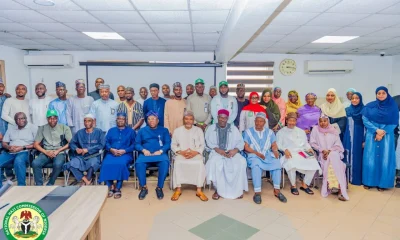COVER
50m Nigerians Risk River Blindness

The Programme Manager, National Onchocerciasis Elimination Programme, Federal Ministry of Health, Mr Michael Igbe, has said that about 50 million Nigerians are at risk of being infected with Onchocerciasis, a disease popularly known as River Blindness.
Igbe said this in Ibadan during a media dialogue organised by the Child Rights Information Bureau (CRIB) of the Federal Ministry of Information and Culture, in collaboration with the United Nations Children Fund (UNICEF).
The manager, who spoke on “Overview on Onchocerciasis Elimination in Nigeria”, said “treatment with ivermectin started in 1989, and in 1997, the Community Directed Treatment with Ivermectin (CDTI) strategy was adopted as the main strategy of programme implementation.
“At inception, Nigeria had interventions covering 32 states and the Federal Capital Territory (FCT). Now, 27 states and the FCT, with about 50 million persons in Nigeria are at risk of onchocerciasis.”
Igbe explained that the disease was caused by the nematode Onchocerca volvulus, which is the second leading cause of preventable blindness.
According to him, onchocerciasis is transmitted by the bite of an infected black fly: Simulium damnosum and other species, breeding in fast-flowing streams and rivers.
He noted that “people become blind early in life as from 20-30 years.”
He added that the major challenge faced in addressing the disease was insecurity in some local government areas.
Others, he said, were poor funding by government and inadequate logistics for Neglected Tropical Diseases (NTDs) programme.
He noted that NTDs are viral, parasitic and bacterial diseases that mainly affect the world’s poorest people.
Malaria Dangerous in Pregnancy – Parasitologist
Similarly a Medical Parasitologist, Dr Adeniyi Adelodun, warned that malaria can be a death factor for pregnant women if not properly treated.
Adelodun, who spoke at the Estate Youth Parliament (EYP) Health Talk in Lagos said: “Malaria infection during pregnancy can have adverse effects on both mother and the fetus.
“Malaria is a life-threatening disease and typically transmitted through the bite of an infected Anopheles mosquitoes.
“Infected mosquitoes carry the plasmodium parasite and when this mosquito bites one, the parasite is released into the bloodstream.
“Once the parasites are inside the body, they travel to the liver, where they mature. After several days, the mature parasites enter the bloodstream and begin to infect red blood cells.
“Within 48 to 72 hours, the parasites inside the red blood cells multiply, causing the infected cells to burst open.
“The parasites continue to infect red blood cells, resulting in symptoms that occur in cycles that last for two to three days at a time,” he said.
On some of the effects of malaria during pregnancy, he said they include maternal anaemia, fetal loss, premature delivery, intrauterine growth re-effects of malaria on tardation, and delivery of low birth-weight infants (<2500 g or <5.5 pounds).
“Malaria can occur if a mosquito infected with the plasmodium parasite bites one. There are four kinds of malaria parasites that can infect humans: Plasmodium vivax, P. ovale, P. malariae, and P. falciparum.
“P. falciparum causes a more severe form of the disease and those who contract this form of malaria have a higher risk of death.
“An infected mother can also pass the disease to her baby at birth, which is known as congenital malaria.’’
On the management of malaria during pregnancy, he said: “For pregnant women, it includes the use of chloroquine, quinine, atovaquone-proguanil, clindamycin, mefloquine (avoid in first trimester), sulfadoxine-pyrimethamine (avoid in first trimester) and the artemisinins.
“Even the World Health Organisation (WHO) now recommends that all women in the second or third trimester of pregnancy who have uncomplicated P. falciparum malaria should be treated with artemisinin-based combination therapy.’’
According to Adelodun, the symptoms of malaria typically develop within 10 days to four weeks following the infection.
“While in some cases, symptoms might not develop for several months and some malarial parasites could enter the body but will be dormant for long periods of time.
“Common symptoms of malaria include shaking chills that can range from moderate to severe high fever, profuse sweating, headache, nausea, vomiting, abdominal pain, diarrhoea, anaemia, muscle pain, convulsions, coma and bloody stools,’’ he said.
COVER
Senate Investigates $18.5bn Abuja Centenary City Project

By Eze Okechukwu, Abuja
Senate yesterday set up a seven-member ad-hoc committee to investigate the circumstances surrounding the lack of completion of the $18.5billion Abuja Centenary Economic City project, a decade after commencement.The Upper Chamber tasked the committee to review the original Public Private Partnership agreement and recommend amendments if necessary to facilitate the smooth and expeditious completion of the project.
The Senate also urged the Federal Government to prioritise the revival of the Centenary City project by providing appropriate support, resolving regulatory issues and addressing any other impediments, given its beneficial potential to the economy and people of Nigeria after 10 years of stalled progress. The resolutions of the senate followed its consideration of a motion titled: “Urgent need to revive and complete the stalled Centenary City Project, to realise its economic and development potential” during plenary yesterday.The motion was sponsored by the Deputy Senate Leader, Senator Ashiru Yisa (APC – Kwara South).Senator Yisa in his lead debate urged colleagues to note that the Abuja Centenary Economic City project commenced in 2014 through a public private partnership to develop a modern city in the mood of Dubai, to commemorate 100 years of Nigeria’s amalgamation celebration.The Abuja Centenary Economic City Project was to be built according to the model and standard of global smart cities like Dubai, Monaco and Singapore.President Goodluck Jonathan laid foundation for the project on February 27, 2014 with a funfare.After Jonathan was defeated in the 2015 general elections, the succeeding Muhammadu Buhari administration put a halt to the project.The project driven by private investors was launched to mark the 100th anniversary of Nigeria costing $18b with 10–15 years completion period.COVER
CBN Gives POS Operators July 7 Deadline to Register with CAC

By Tony Obiechina, Abuja
The Central Bank Of Nigeria (CBN) has issued a July 7, 2024 deadline for Point of Sales (PoS) operators to complete registration with the Corporate Affairs Corporation (CAC).This was revealed during a meeting between Fintechs and the Registrar-General/Chief Executive Officer (CAC) Hussaini Magaji (SAN) in Abuja on Tuesday.
Speaking at the event, the CAC boss said the two-month timeline to register their agents, merchants, and individuals with the commission, was “in line with legal requirements and the directives of the Central Bank of Nigeria”. “The measure aims at safeguarding the businesses of Fintech’s customers and strengthening the economy,” a statement titled ‘CAC, PoS Operators Agree to Two-Month Deadline to Register Their Agents and Merchants to Strengthen the Fintech Industry”, the CAC added.He stressed that the action was equally backed by Section 863, Subsection 1 of the Companies and Allied Matters Act, CAMA 2020, and the 2013 CBN guidelines on agent banking.Magaji explained that the timeline for the registration which will expire on July 7, 2024, was not targeted at any groups or individuals but aimed at protecting businesses.Several speakers from the Fintech industry pledged to collaborate with the commission to ensure hitch-free implementation of the directive.Some of them, however, stressed the need for adequate and collective sensitisation, to ensure that the exercise achieved the desired results.The Special Adviser to the President on ICT Development and Innovation, Tokoni Peter, in his remarks, pledged to ensure smooth facilitation of the process in line with the Renewed Hope Initiative of the present administrationThe representatives of Opay, Momba, Palmpay Ltd, Pay Stack, Fair Money MFB, Monie Point, and Teasy Pay present at the event, later signed up for a document to support the project.COVER
CBN Exempts Salaries, Loans, Pensions, Donations from Cyber Security Levy

By Tony Obiechina, Abuja
Central Bank of Nigeria (CBN) has exempted 16 items from the 0.5 per cent Cybersecurity levy on all electronic transactions.CBN had directed banks to begin charging 0.5% cybersecurity levy on transactions as part of efforts to contain the rising cybercrime threats in the financial system.
According to the Apex Bank, deducted funds will be remitted to the National Cybersecurity Fund (NCF), which shall be administered by the Office of the National Security Adviser (ONSA). A circular released by the CBN on Monday directed all commercial, merchant, non-interest and payment service banks to comply with the directive.The circular revealed that it was a follow-up on an earlier letter dated June 25, 2018 (Ref: BPS/DIR/GEN/CIR/05/008) and October 5, 2018 (Ref: BSD/DIR/GEN/LAB/11/023), in compliance with the Cybercrimes (Prohibition, Prevention, Etc.) Act 2015.Following the enactment of the Cybercrime (Prohibition, Prevention, etc) (amendment) Act 2024 and under the provision of Section 44 (2)(a) of the Act, a levy of 0.5 per cent (0.005) equivalent to half per cent of all electronic transactions value by the business specified in the Second Schedule of the Act is to be remitted to the National Cybersecurity Fund, which the Office of the National Security Adviser shall administer.The exemptions included loan disbursements and repayments, salary payments, intra-account transfers within the same bank or between different banks for the same customer, intra-bank transfers between customers of the same bank, and Other Financial Institutions (OFIs) instructions to their correspondent banks.The exemption also applies to interbank placements, banks’ transfers to CBN and vice versa, inter-branch transfers within a bank, cheque clearing and settlements, and Letters of Credit (LCs).Others include banks’ recapitalisation-related funding only bulk funds movement from collection accounts; savings and deposits including transactions involving long-term investments such as treasury bills, bonds; and commercial papers; government social welfare programmes transactions, e.g. pension payments; non-profit and charitable transactions including donations to registered non-profit organisations or charities; educational institutions transactions, including tuition payments and other transaction involving schools, universities, or other educational institutions.Transactions involving the bank’s internal accounts, such as suspense accounts, clearing accounts, profit and loss accounts, inter-branch accounts, reserve accounts, nostro and vostro accounts, and escrow accounts, are also exempt from the levy.The central bank warned that Section 44 (8) of the Act prescribes that failure to remit the levy constitutes an offence punishable on conviction by a fine of not less than two percent of the defaulting business’s annual turnover, among other things.




















